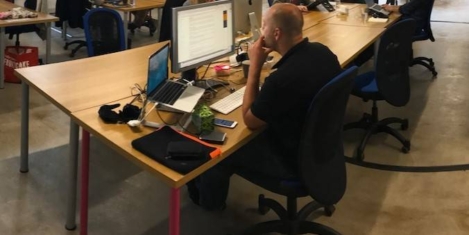January 19, 2018
Working families at breaking point as parents buckle under the strain of overwork, claims study
 The UK’s working parents are struggling to cope with the strain of overwork – and deliberately stalling and downshifting their careers to reverse the negative impact it is having on family life, according to a new study. The 2018 Modern Families Index, published today by work life charity Working Families and Bright Horizons, reveals the stress of the modern workplace is pushing parents to breaking point, creating a ‘parenthood penalty’. According to the study, many parents are obliged to work far over their contracted hours due to increasingly intense workloads or because they feel it is expected of them.
The UK’s working parents are struggling to cope with the strain of overwork – and deliberately stalling and downshifting their careers to reverse the negative impact it is having on family life, according to a new study. The 2018 Modern Families Index, published today by work life charity Working Families and Bright Horizons, reveals the stress of the modern workplace is pushing parents to breaking point, creating a ‘parenthood penalty’. According to the study, many parents are obliged to work far over their contracted hours due to increasingly intense workloads or because they feel it is expected of them.









 Two-thirds (64 percent) of employees have gone to work despite being unwell over the last 12 months, claims a new survey which found that a quarter (26 percent) of people worried that their absence will be a burden on their team. The research by Bupa shows that more than one in four (27 percent) employees ignore their doctor’s orders to stay at home and ‘soldier on’. A third of employees would go to work despite back pain or issues related to their joints and, disturbingly, a similar number (29 percent) head to work when suffering from mental health issues such as depression. As two of the most common reasons to be signed off work, Bupa’s experts fear these employees risk worsening their health, increasing the likelihood that they’ll need a prolonged period of time off work further down the line. The findings come at a time when increasing productivity is a strategic goal for most business leaders in 2018. But high levels of ‘presenteeism’ are in fact associated with loss of productivity and reduced performance – as employees who push themselves into work when unwell, risk delaying their own recovery
Two-thirds (64 percent) of employees have gone to work despite being unwell over the last 12 months, claims a new survey which found that a quarter (26 percent) of people worried that their absence will be a burden on their team. The research by Bupa shows that more than one in four (27 percent) employees ignore their doctor’s orders to stay at home and ‘soldier on’. A third of employees would go to work despite back pain or issues related to their joints and, disturbingly, a similar number (29 percent) head to work when suffering from mental health issues such as depression. As two of the most common reasons to be signed off work, Bupa’s experts fear these employees risk worsening their health, increasing the likelihood that they’ll need a prolonged period of time off work further down the line. The findings come at a time when increasing productivity is a strategic goal for most business leaders in 2018. But high levels of ‘presenteeism’ are in fact associated with loss of productivity and reduced performance – as employees who push themselves into work when unwell, risk delaying their own recovery




 It appears to have been a challenging year for HR professionals, as a new survey suggests nearly three quarters (72 percent) of participants in a recent survey feel slightly or significantly more over-stretched in their role compared to last year. Forty four percent believe the workforce does not have enough support to thrive, and a further 23 percent don’t feel confident that their organisations are doing enough to address this issue. Research from a survey of HR people conducted by Cascade HR found that 32 percent of HR managers have found employment legislation harder to navigate. However, a reassuring 61 percent of HR professionals now feel ‘somewhat prepared’ for GDPR, which has understandably taken up a lot of preparatory time and resource as 2017 has unfolded. In fact, only 15 percent of HR professionals surveyed feel significantly or slightly underprepared, which seems to contradict national statistics on a business-wide level.
It appears to have been a challenging year for HR professionals, as a new survey suggests nearly three quarters (72 percent) of participants in a recent survey feel slightly or significantly more over-stretched in their role compared to last year. Forty four percent believe the workforce does not have enough support to thrive, and a further 23 percent don’t feel confident that their organisations are doing enough to address this issue. Research from a survey of HR people conducted by Cascade HR found that 32 percent of HR managers have found employment legislation harder to navigate. However, a reassuring 61 percent of HR professionals now feel ‘somewhat prepared’ for GDPR, which has understandably taken up a lot of preparatory time and resource as 2017 has unfolded. In fact, only 15 percent of HR professionals surveyed feel significantly or slightly underprepared, which seems to contradict national statistics on a business-wide level.




 Impostor syndrome (where we feel like we are ‘faking it’ at the job we are doing) could be holding back many senior executives from realising their potential – according to new research from Dropbox on the state of teamwork within businesses in the UK. The research, which marks the launch of a new study, conducted in conjunction with philosophers at The School of Life reveals that 80 percent of Chief Executive Officers (CEOs) and 81 percent of Managing Directors say they sometimes feel ‘out of their depth’ and as if they are ‘struggling’ in their role. The research investigates behaviours in business that are limiting to great teamwork. Being averse to disagreeing with others – often seen as a typically British trait – is identified as a key issue holding back teams within British business. The data also claims that two thirds of British workers (69 percent) say that they aren’t comfortable disagreeing with others at work.
Impostor syndrome (where we feel like we are ‘faking it’ at the job we are doing) could be holding back many senior executives from realising their potential – according to new research from Dropbox on the state of teamwork within businesses in the UK. The research, which marks the launch of a new study, conducted in conjunction with philosophers at The School of Life reveals that 80 percent of Chief Executive Officers (CEOs) and 81 percent of Managing Directors say they sometimes feel ‘out of their depth’ and as if they are ‘struggling’ in their role. The research investigates behaviours in business that are limiting to great teamwork. Being averse to disagreeing with others – often seen as a typically British trait – is identified as a key issue holding back teams within British business. The data also claims that two thirds of British workers (69 percent) say that they aren’t comfortable disagreeing with others at work.
















December 19, 2017
We need to have an honest conversation about presenteeism
by Steve Brewer • Comment, Flexible working, Workplace design
More →